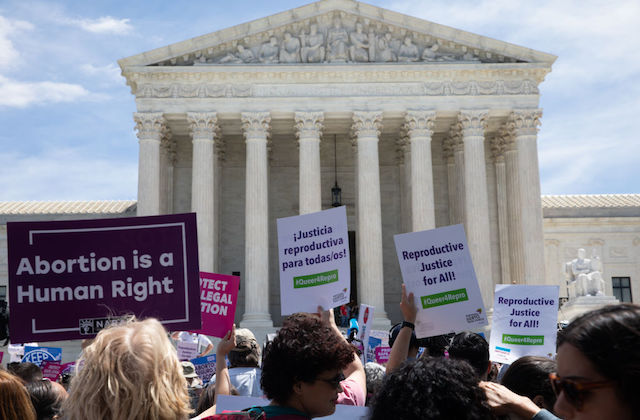The Supreme Court of the United States just issued a ruling on abortion that did not give a clear indication of how its conservative majority might rule in future cases that could overturn Roe v. Wade. Issued yesterday (May 28), it was the Court’s first ruling on a case that challenged the constitutionality of a restrictive state law since the appointment of Justice Brett Kavanaugh.
In the case, Box v. Planned Parenthood of Indiana and Kentucky, the justices ruled on a two-part Indiana law. The law bans abortions motivated solely because of the fetus’ sex, race or disability. It also mandates that abortion providers bury or cremate fetal remains. In court papers, the state’s Attorney General Curtis Hill Jr. said the requirement “expands on long-established legal and cultural traditions of recognizing the dignity and humanity of the fetus.”
Reports The New York Times:
rnt
The Supreme Court on Tuesday sidestepped part of a case that could have tested the constitutional right to abortion established in Roe v. Wade, turning down an appeal to reinstate a strict Indiana abortion law. But the court, in an apparent compromise, upheld part of the same law regulating the disposal of fetal remains.
Justices Ruth Bader Ginsburg and Sonia Sotomayor dissented in the 7-2 decision on fetal remains.
As noted in a tweet sent by SCOTUSblog, the decision was made without hearing oral arguments:
rnt
Without oral argument,#SCOTUS upholds Indiana law requiring fetal remains to be buried or cremated, denies review of law barring abortions based on fetus’s race/sex/disability, leaving in place lower-court ruling striking down that law
rnt— SCOTUSblog (@SCOTUSblog) May 28, 2019
rn
rntThe measure was signed into law in 2016, by then-Governor Mike Pence, before he became vice president of the United States. It was blocked from going into effect last year by the United States Court of Appeals for the Seventh Circuit, reports CNN.
According to the Indiana State Department of Health, 7,172 state residents had abortions in 2017, the latest year for which data is available. Of those, 57 percent were classified as White, 31 percent as Black and 8 percent as Latinx.
As Colorlines has previously reported, there has been a surge of restrictive laws passed at the state level by conservatives who hope they will be challenged before the Supreme Court and used to overturn Roe v. Wade. PBS reports that with the Indiana ruling, “The high court, with two liberal justices dissenting, thus found a way perhaps to signal a greater receptivity to state restrictions in the area of abortion without yet welcoming a more direct challenge to abortion rights.”
Conservative Justice Clarence Thomas said, in his 20-page opinion on the decision, that it is just a matter of time before SCOTUS more forcefully enters the national abortion conversation. “Although the Court declines to wade into these issues today, we cannot avoid them forever,” Thomas wrote. “Having created the constitutional right to an abortion, this court is duty-bound to address its scope.”
In response, CNN Supreme Court analyst Steve Vladeck said, “Although Justice Thomas argues that the court will soon have to take up the issue it ducked today, I think it’s telling that none of the other conservative justices—John Roberts, Samuel Alito, Neil Gorsuch and Brett Kavanaugh—joined his separate opinion. It’s quite possible that Thomas’ opinion is therefore less a prediction of where the court is likely to go than an aspiration.”
The same day that SCOTUS issued its Indiana decision, Planned Parenthood of America announced that its Missouri clinic—the only place in the state that provides abortions—will likely be forced to stop offering the procedure or else lose its operating license for all medical care. It the center closes, Missouri, which passed an eight-week ban on abortion last week, will become the only state in the nation without an abortion clinic.
